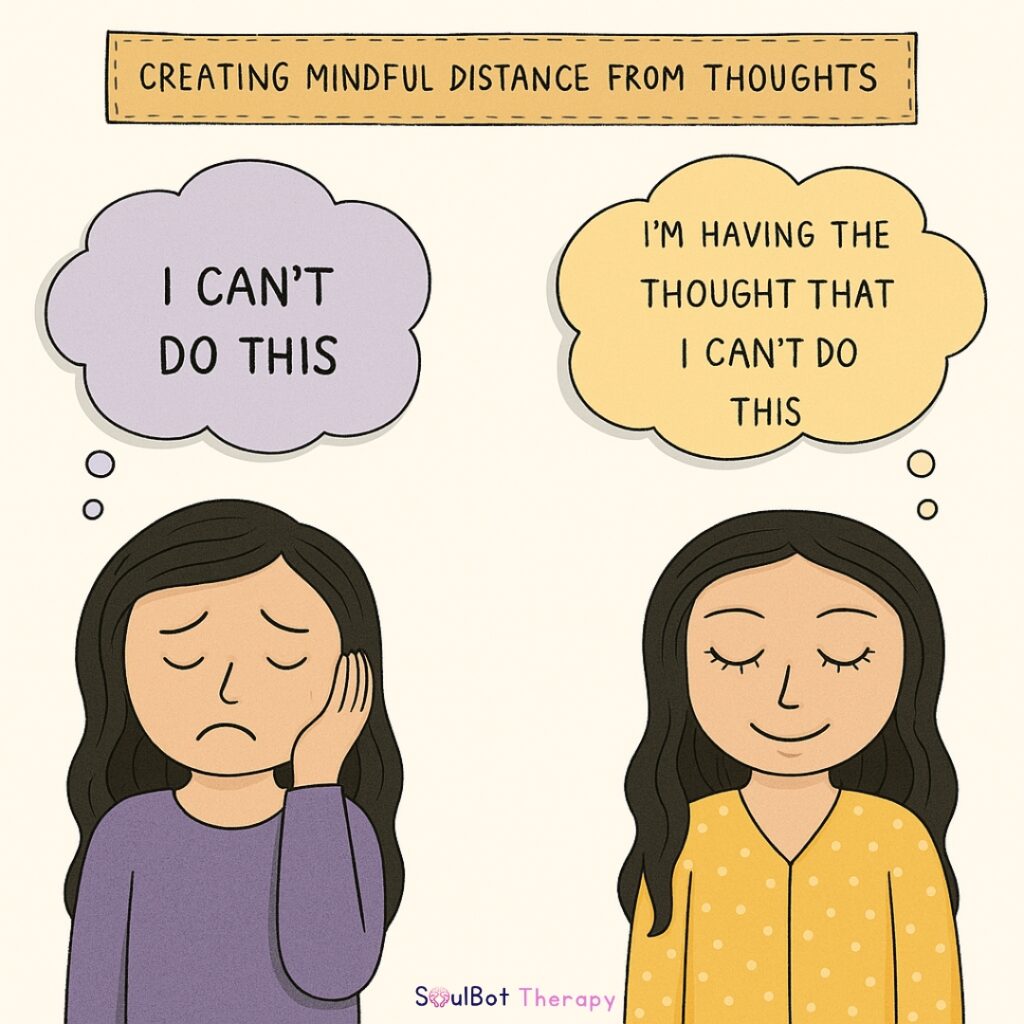Feeling stuck in your head? Struggling with thoughts you can’t shake? You’re not alone—and you don’t need to “fix” your thinking to feel better. That’s the heart of Acceptance Commitment Therapy, also called ACT therapy.
In this guide, we’ll walk you through what acceptance and commitment therapy is, how it works, and how it can help you manage stress, anxiety, and overwhelming emotions in a healthier, more freeing way.
🧘♀️ Looking for clarity and support? Try SoulBot, your personalized Mental Health Coach, for tools uplifted by ACT therapy and values-based action.What Is Acceptance Commitment Therapy?
Acceptance and Commitment Therapy (ACT) is a modern type of psychotherapy that doesn’t ask you to fight your thoughts—it teaches you to accept them, understand them, and move forward with purpose.
Instead of trying to erase pain or anxiety, ACT helps you make room for it—and live well anyway.
ACT stands for:
- Acceptance – Letting thoughts and feelings be present without trying to control or hold them.
- Commitment – Choosing values-based actions, even in the presence of discomfort and distress.
- Therapy – Learning tools to build a meaningful life, not just eliminate symptoms.
It’s about showing up for yourself, even when your mind isn’t being kind.
📚 Learn more from the experts at the Association for Contextual Behavioral Science—the global hub for ACT research and resources.
ACT in Psychology: The Core Principles
In psychology, ACT is considered part of the third wave of behavioral therapies. It combines mindfulness strategies with behavior change techniques. The six core processes are:
- Cognitive Defusion – Learning to see thoughts as just thoughts—not truths.
- Acceptance – Making room for emotions rather than avoiding them.
- Being Present – Grounding yourself in the current moment.
- Self-as-Context – Understanding you are more than your thoughts or labels.
- Values Clarification – Identifying what truly matters to you.
- Committed Action – Taking steps toward your values, not your fears.
Together, these skills help you build what ACT calls psychological flexibility—the ability to stay open, centered, and committed to action, even when life is hard.
🔗Want to see how emotional intelligence plays a role in healing? Read this guide on emotional intelligence in relationships.
ACT Therapy Techniques That Actually Help
Here are a few common tools used in ACT therapy:
- Mindfulness Exercises – Simple breathing or sensory practices to anchor yourself.
- Thought Labeling – Instead of saying, “I am anxious,” you learn to say, “I’m having the thought that I’m worried.” This creates space.
- Values Mapping – Identifying your values (like kindness, honesty, or growth) and setting goals that align with them.
- Willingness Exercises – Practicing openness to discomfort instead of avoiding it.
These techniques are practical, flexible, and designed to help in real-life moments—not just in therapy sessions.
Why Choose Acceptance Therapy Over Traditional Talk Therapy?
Most traditional therapy focuses on analyzing your past or challenging negative thoughts. That can work—but it’s not for everyone.
Acceptance therapy meets you where you are. It says: You don’t need to be “fixed.” You just need to stop running from pain and start moving toward meaning.
Instead of “What’s wrong with me?” ACT asks, “What’s important to me, and how do I take action despite my pain?”

Who Can ACT Therapy Help?
ACT has shown powerful results for people dealing with:
- Anxiety and stress
- Depression
- OCD
- Trauma
- Chronic pain
- Perfectionism
- Life transitions
If you’ve ever felt like your thoughts or emotions are running your life, ACT might be what you need to take back control—without expecting everything to feel perfect first.
In A Nutshell
Acceptance Commitment Therapy isn’t about fixing you—it’s about freeing you. By understanding to accept what’s out of your control and committing to what truly matters, ACT helps you build a life rooted in purpose, not fear. Whether you’re new to therapy or looking for a fresh approach, ACT offers a powerful path toward healing and growth.
🤖 Explore emotional growth with our AI Mental Health Support and take your first step toward mindful healing with a free Mental Health Assistant.FAQs
1. What is Acceptance and Commitment Therapy used for?
ACT helps control anxiety, depression, trauma, and stress by promoting acceptance and values-based action.
2. Is ACT therapy evidence-based?
Yes! ACT is supported by decades of research and is used in clinical settings worldwide.
3. How does ACT differ from CBT?
CBT focuses on changing thoughts. ACT focuses on accepting thoughts and choosing actions based on values.
4. Can I practice ACT therapy techniques on my own?
Absolutely. Many ACT tools, like mindfulness and weight exercises, can be self-guided.
5. How long does ACT therapy take?
It depends. Some benefit in a few months, while others integrate ACT as a lifelong toolkit for mental health.




